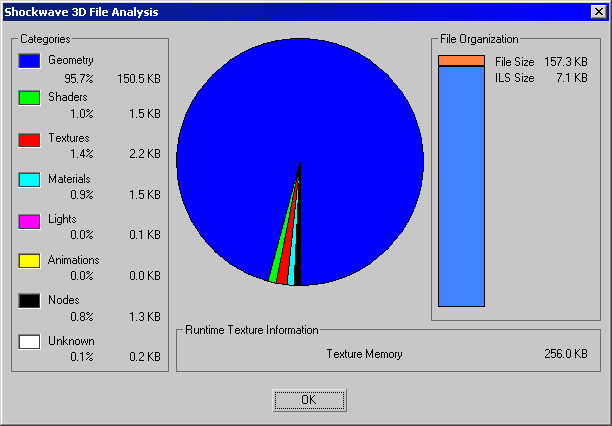This window provides a graphic breakdown of the data in the W3D file. Click OK to close the window.

- Pie Chart
-
Graphic display of the proportion of the file used by all of the W3D file data types. Refer to the color-coded Categories list, which gives a percentage and an absolute size in kilobytes of each asset:
- Geometry (in the initial load segment, if a model has a zero priority in the sw3d_stream_priority user property, or in the streamable portion of the file, if a model has a non-zero streaming priority)
- Shaders (only in the initial load segment)
- Textures (in the initial load segment, if the model that uses the texture has a zero priority in the sw3d_texture_stream_priority user property, or in the streamable portion of the file, if a model has a non-zero streaming priority)
- Materials (only in the initial load segment)
- Lights (only in the initial load segment)
- Animations (only in the initial load segment) Note: Large animations can greatly lengthen the time it takes to see the start of a Shockwave 3D animation, because they must fully download before any of the scene can becomes visible.
- Nodes or scenegraph hierarchy data (only in the initial load segment)
- Unknown includes, for example, streaming priorities, names, and block sizes.
- File Organization
-
Graphic display of the size of the entire file and its initial load segment (ILS) portion. The ILS, in orange, consists of all the data that must be loaded before Shockwave will display the scene (scenegraph data, animations, shaders, and any textures or geometry with a streaming priority of zero). The rest of the file, in light blue, represents all of the streamable data with a non-zero streaming priority. This data will continue to load and fill out the detail of the scene as the download proceeds.
- Runtime Texture Information
-
Approximate texture memory that will be required at run time to display the textures in the scene. Scenes requiring more than a few megabytes of texture memory will require accelerated graphics cards to display textures at their full resolution.